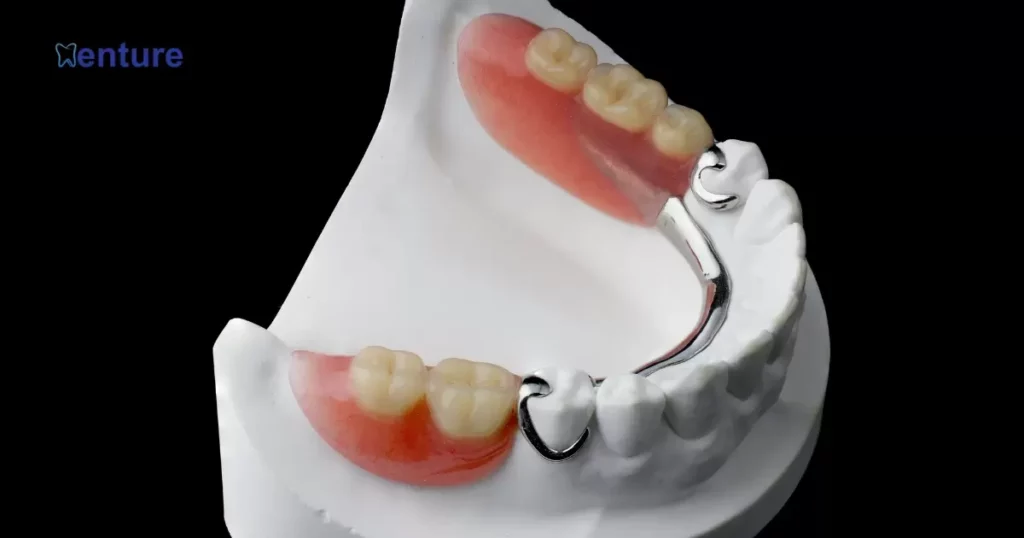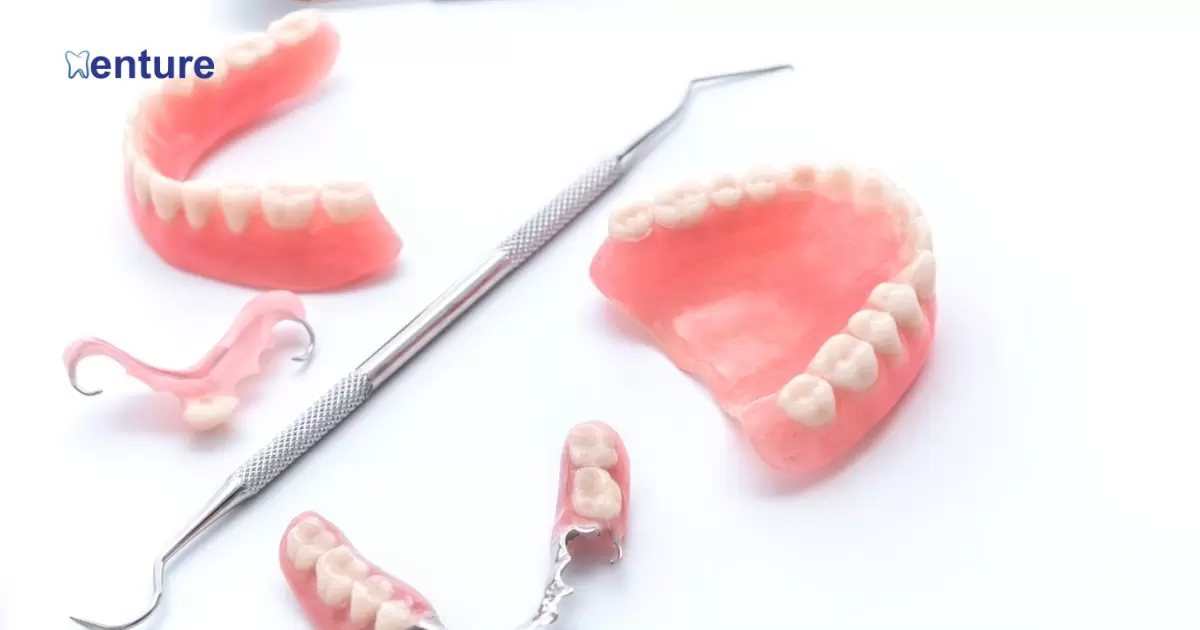Partial dentures are removable dental appliances used to replace missing teeth. They’re custom-made to fit comfortably in the mouth and are held in place by clasps that attach to existing teeth.
Want to know how to make partial dentures at home? It’s not as simple as a DIY project. Crafting partial dentures requires professional expertise. These custom-made devices, fitted by dentists, help you regain your smile and chewing ability if you have missing teeth.
Partial dentures, as we mentioned earlier, are essential for replacing missing teeth. They’re not just about aesthetics; they play a crucial role in maintaining oral health. These custom-crafted dental devices help prevent other teeth from shifting, ensuring your bite remains balanced.
Why Should You Be Careful of Home Denture Kits?
Home denture kits may seem like a cost-effective solution, but there are reasons to be cautious. First, they often lack the precision required for a comfortable fit. Ill-fitting dentures can lead to discomfort and difficulty eating or speaking.
Attempting to create your own dentures at home can result in unsatisfactory aesthetics. The color, shape, and alignment of teeth in dentures should mimic your natural smile. Home kits might not achieve the lifelike appearance that a skilled dentist can provide.
| Issue | Description |
| Precision and Comfort | Home denture kits often lack precision, leading to ill-fitting dentures that cause discomfort and difficulties with eating or speaking. |
| Aesthetic Concerns | Home kits may not achieve a lifelike appearance, affecting the color, shape, and alignment of denture teeth. |
| Cheap Materials | Home kits may use cheap materials, resulting in less durable dentures that are prone to breaking and may not be biocompatible. |
| Denture Functionality | Well-fitted dentures are essential for eating, speaking, and smiling comfortably; home kits may fall short in achieving this. |
| Perils of Denture Repair Kits | DIY repairs with denture repair kits may lead to ill-fitting dentures, discomfort, and potential damage; low-quality materials can compromise durability. |
| Toxic Super Glue | Using toxic superglue to fix dentures can expose the mouth to harmful chemicals, risking health issues; consulting a dentist is recommended. |
Aesthetic Issues
Aesthetic issues can arise when using home denture kits. These kits may not provide the lifelike appearance that professionally crafted dentures offer. The color, shape, and alignment of the teeth in your dentures should mimic your natural smile.
Cheap Materials
Home denture kits often use cheap materials. These subpar materials can result in dentures that are less durable and prone to breaking. Low-quality materials may not be biocompatible, potentially causing allergic reactions or discomfort in your mouth.
Denture Functionality
Denture functionality is crucial for your daily life. Well-fitted dentures ensure you can eat, speak, and smile comfortably. Home denture kits often fall short in achieving this, potentially causing difficulties in your daily activities.
Perils of a Denture Repair Kit
Denture repair kits may seem like a quick fix, but they come with perils. These kits are often a temporary solution and may not address the underlying issues with your dentures. Attempting to fix them at home can lead to ill-fitting dentures, causing discomfort and further damage. Should You Get New Dentures is a question you should consider when facing persistent issues with your current ones.
The materials in these kits may not be of the same quality as those used by professionals, compromising their durability. In the end, DIY repairs might cost you more in the long run, both in terms of money and potential dental problems.
Toxic Super Glue
Beware of using toxic superglue to fix dentures. This strong adhesive can contain harmful chemicals that are not safe for oral use. Applying it to your dentures may expose your mouth to toxins, risking serious health issues.
The fumes from toxic superglue can be harmful when inhaled. The safer choice is to consult a dentist for denture repairs or replacements.
The partial denture fabrication process

The partial denture fabrication process is a precise and methodical procedure. It begins with a dental impression, where molds are taken from your mouth. These molds serve as the foundation for creating custom-fitted dentures tailored to your unique oral anatomy.
Next, skilled dental technicians use these molds to craft the denture framework. This framework, made of strong materials, supports artificial teeth that mimic the look and function of your natural teeth.
What material is commonly used for partial dentures?
Partial dentures are often made from acrylic or a combination of acrylic and metal. Acrylic is a common choice for the base of the denture, as it’s lightweight and comfortable. For added strength, metal clasps or frameworks can be incorporated, improving stability and durability.
These materials were selected because of their resilience and compatibility with oral tissues. They allow for a custom fit, ensuring that your partial dentures feel secure and function properly.
How do you make dentures step by step?
Creating dentures is a complex process typically carried out by dental professionals. Here’s a simplified, step-by-step overview:
Initial Consultation: The process begins with a thorough examination of the patient’s mouth. This includes taking impressions, photos, and measurements to understand their specific needs.
Primary Impressions: A preliminary mold of the patient’s mouth is made using a soft, putty-like material. This initial impression provides a basic framework.
Secondary Impressions: A more precise impression is taken using a more rigid material, capturing fine details for a customized fit.
Bite Registration: The dentist records how the upper and lower jaws come together to ensure proper alignment and bite.
Wax Try-In: A wax model of the dentures is created for the patient to try. Adjustments are made as necessary to ensure a comfortable fit and natural appearance.
Final Denture Fabrication: The final denture is cast using acrylic or other suitable materials for the base and artificial teeth. Metal clasps may be added for stability in partial dentures.
Final Fitting and Adjustments: The completed dentures are fitted, and further adjustments are made for comfort and functionality.
Follow-Up Care: Patients receive guidance on denture care, cleaning, and regular check-ups to ensure they fit properly over time.
Can You Eat With Diy Dentures?
Using DIY dentures to eat can be challenging. These homemade options may not fit securely, making it difficult to chew and enjoy your food. Additionally, the materials used in DIY dentures might not be as durable as those in professionally made ones, increasing the risk of breakage while eating.
DIY dentures may not provide the necessary support for proper digestion, as they can affect your bite and overall oral health. It’s advisable to consult a dentist to ensure your dentures are custom-made for a comfortable and effective eating experience.
Best Diy Denture Kit
For those seeking a reliable DIY denture kit, it’s crucial to choose wisely. The best DIY denture kits offer convenience, affordability, and quality. They typically come with clear, step-by-step instructions, making the process accessible for individuals looking to fix minor issues with their dentures at home.
These kits often include premium materials, ensuring a secure and lasting repair. While they are a helpful option for minor problems, it’s important to remember that more complex issues should still be addressed by a professional dentist.
FAQ’s
Are there DIY kits for making partial dentures at home?
No, there are no DIY kits available for making partial dentures at home.
Why is it not recommended to make dentures at home?
Homemade dentures can lead to ill-fitting, uncomfortable, and potentially harmful results.
What should I do if I need partial dentures?
Consult with a qualified dentist who can create custom partial dentures to meet your specific needs.
Conclusion
Partial dentures are a vital solution for missing teeth. They not only enhance your appearance but also support proper chewing and speech. While it might be tempting to consider Make Partial Dentures At Home options with denture repair kits, these methods may lead to complications and short-term fixes. It’s wiser to trust dental professionals for lasting and reliable results.
On the other hand, when considering DIY denture kits, choose wisely. The best ones offer clear instructions and quality materials for minor fixes. For complex issues, always consult a skilled dentist.











